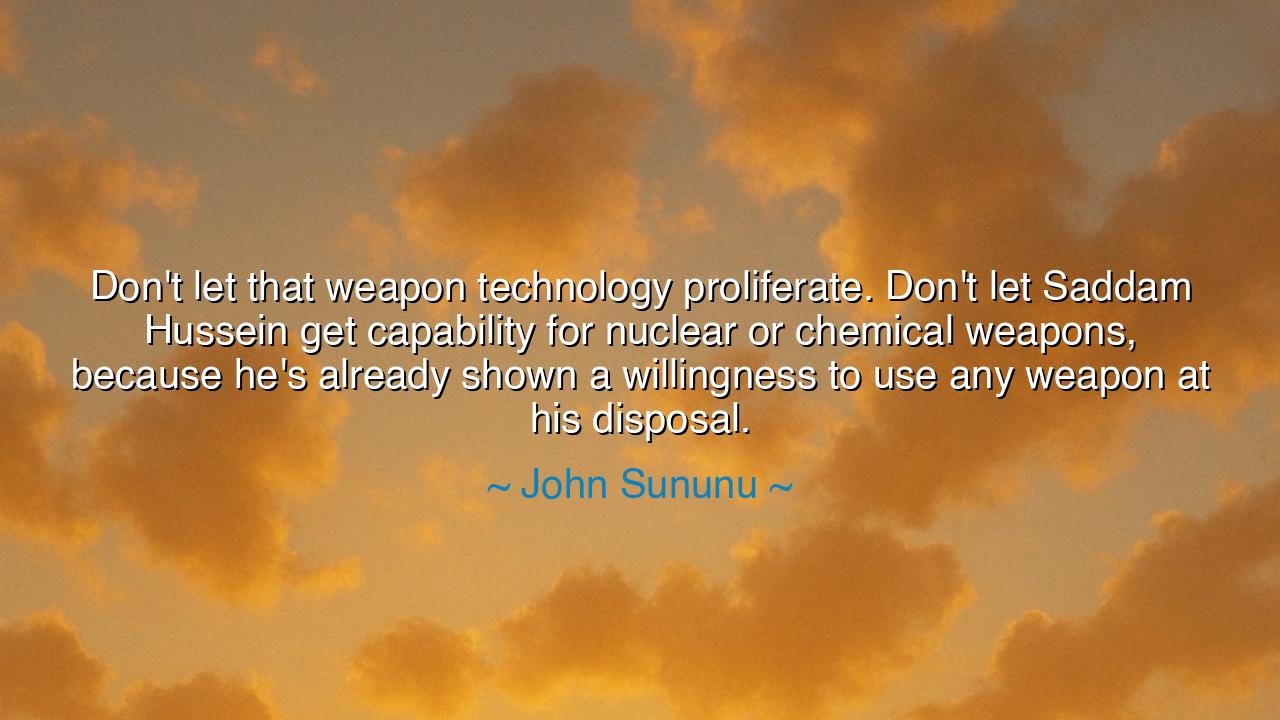
Don't let that weapon technology proliferate. Don't let Saddam
Don't let that weapon technology proliferate. Don't let Saddam Hussein get capability for nuclear or chemical weapons, because he's already shown a willingness to use any weapon at his disposal.






The words of John Sununu, “Don't let that weapon technology proliferate. Don't let Saddam Hussein get capability for nuclear or chemical weapons, because he's already shown a willingness to use any weapon at his disposal,” resound as a stark admonition, echoing with the gravity of both history and human morality. He reminds us that technology, while often a symbol of progress and power, can become a terrible instrument when placed in the hands of those unrestrained by conscience. The caution here is not only political but profoundly human: the capacity to create destruction demands the wisdom to wield it, lest entire populations suffer from unchecked ambition.
The origin of this warning lies in Sununu’s role as Chief of Staff under President George H.W. Bush during the late 20th century, a period when the world watched the actions of Saddam Hussein with growing alarm. Having witnessed the devastation of chemical attacks in the Middle East, and understanding the trajectory of weapons development, Sununu spoke to the necessity of international vigilance. His words emphasize that the proliferation of nuclear and chemical technology is not a theoretical risk, but a tangible danger when wielded by those who have previously demonstrated disregard for human life.
History offers sobering examples of the truth embedded in his message. During World War II, the invention of atomic weapons brought both awe and horror. The capacity to annihilate cities overnight transformed global strategy and moral calculus. Leaders who possessed such power were forced to confront the ethical weight of their decisions. The lesson is timeless: weapons, especially those of mass destruction, magnify both the ambitions and the flaws of those who hold them, making the character of the wielder as consequential as the weapon itself.
Even more recent history underscores Sununu’s caution. In the late 1980s, Saddam Hussein’s use of chemical weapons against the Kurdish population in Halabja demonstrated a ruthless willingness to employ every tool of destruction at his disposal. This historical example validates Sununu’s assertion: when a leader has already shown disregard for life, the addition of advanced weaponry escalates the stakes, magnifying the potential for catastrophe. Technology, in this context, is both catalyst and amplifier of human intent.
The meaning of his words extends beyond geopolitics; they are a meditation on the ethics of power. Technology itself is neither good nor evil, but a mirror of human intent. In the wrong hands, it magnifies cruelty, in the right hands, it preserves and protects. Sununu’s admonition teaches that vigilance, foresight, and moral discernment are inseparable from the advancement and distribution of powerful technologies.
The lesson for generations is urgent: do not treat technology as a neutral force, especially when it bears the capacity to end lives en masse. Recognize that access to destructive power must be accompanied by oversight, accountability, and moral stewardship. History provides repeated proof that those who show a willingness to harm will seize opportunity if unrestrained, making prevention a moral imperative.
Practical action flows from this understanding. Support international agreements, such as non-proliferation treaties, that limit the spread of nuclear, chemical, and other weapons of mass destruction. Advocate for transparency, inspections, and diplomatic solutions that reduce risk while preserving security. On an individual level, educate yourself about the ethical implications of technology and policy, and encourage leaders to weigh not only strategic gain but the moral cost of their decisions.
Thus, let the words of John Sununu endure as a solemn guide: do not allow destructive technology to proliferate in the hands of those who have already demonstrated a willingness to harm. In this principle lies the safeguarding of life itself, a recognition that progress and power are inseparable from responsibility. Let every generation learn that the stewardship of technology is the stewardship of humanity, and that vigilance is the eternal duty of those who value life.






AAdministratorAdministrator
Welcome, honored guests. Please leave a comment, we will respond soon